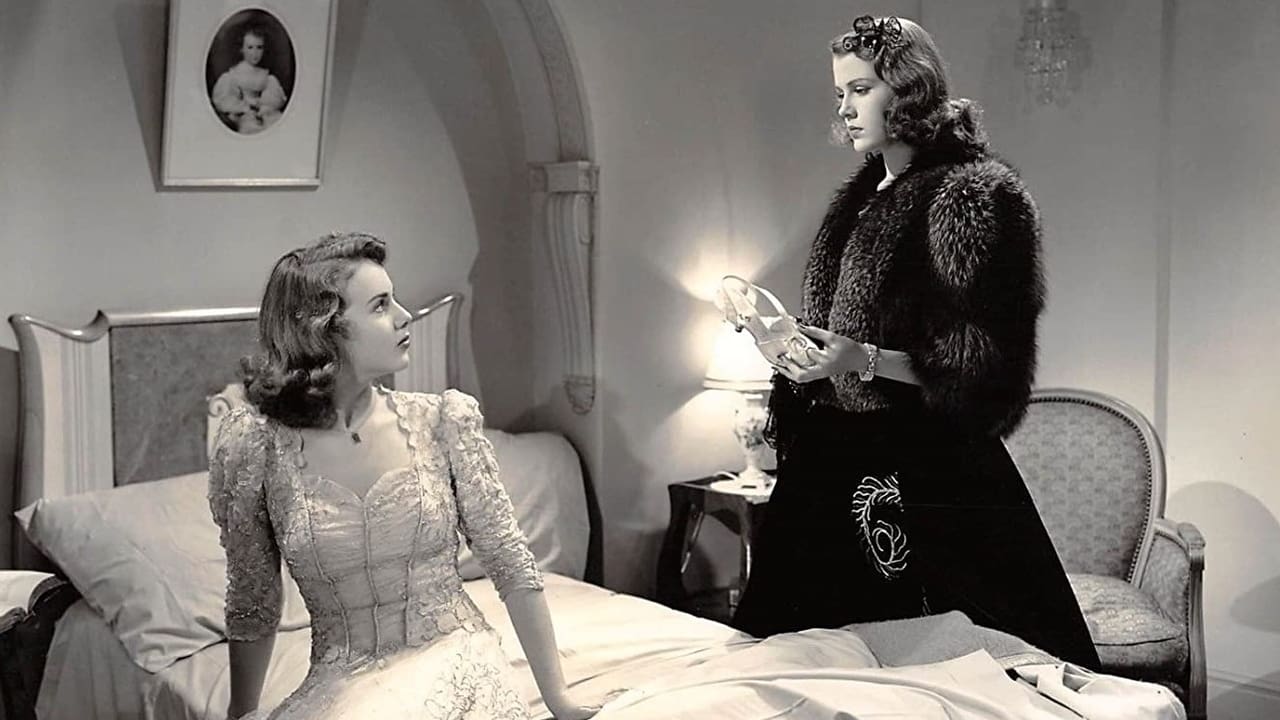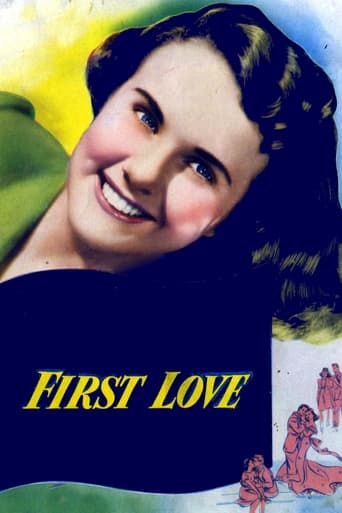

Young Deanna Durbin goes to live with her uncle Eugene Palette and a group of snooty society cousins in this film. They treat her like a country cousin and snub her generally including her aunt by marriage. But little do they know that Deanna is destined to find her First Love in this story reworked from the Cinderella fairy tale.After three years Deanna was growing up on screen and the folks at Universal Pictures decided she ought to have her first screen kiss. The one tapped for the honor was a guy making his screen debut Robert Stack.The one who really treats her rotten is her débutante cousin Helen Parrish and her equally snobby friend June Storey. Deanna is not treated any better than one of the staff at her house, like Cinderella she might as well be relegated to being a chimney sweep.Stack is the guy that Parrish and Storey have set their caps for, he's another society kid. But he likes simple and unaffected Deanna who ironically Parrish sets up the meeting between them. That's a rather funny scene.Some good songs for Durbin highlighted the classic There's No Place Like Home, Amapola, and Un Bel Di from Madame Butterfly. And of course one of the most publicized kisses ever in screen history.First Love brought home Oscar nominations for Sound, Art&Set Decoration, and Musical Scoring for Universal Pictures. Little Miss Fix-It was definitely growing up and her future roles would show a maturing Durbin for the movie-going public. It still is fine entertainment.
... View MoreReviewers before me have ably stated the performers and crew who have contributed to this timeless presentation of the Cinderella story.I join with a previous enthusiast who identifies the Strauss medley sung by Miss Durbin at the Royal Ball as being singularly excellent. The third melody which was unidentifiable at that time turns out to be a waltz from Strauss' little known operetta "A Night in Venice". Thus we have: 'Life is sweet and gay. . .' the Schatz waltz from the "Gypsy Baron"; 'This is Maytime. . . .' from the "Southern Roses"; and finally, 'Spring in my heart.. . .' from " A Night in Venice". It is the 'Gondellied' or Venetian Boat Song from that operetta. And yes, the accompaniment flourish at the end includes a few bars of the '1001 Nights' from the "Gypsy Baron" before finishing with 'Voices of Spring'. The medley has been seamlessly sewn together by Hans J. Salter, and Ralph Freed supplied the lyrics. A joy to listen to.The success of the movie is first and foremost the performance of Deanna Durbin, of course, but turning her rendition of "One Fine Day" into a happy ending is to be recognized as an achievement by the producers and writers. All in all, a movie for everyone.
... View MoreFIRST LOVE (Universal, 1939), directed by Henry Koster, stars Deanna Durbin in one of her ever popular movie roles. Basically a retelling of the old "Cinderella" story set in contemporary New York City, the youthful Durbin, making her sixth screen appearance, and Robert Stack, in movie debut, are supported by fine movie veterans, namely gravel voice Eugene Palette, Leatrice Joy (former lead actress of the silent screen), and Kathleen Howard in a small but important role as the crusty but wise old-maid school teacher with a heart of gold. Aside from her previous works opposite W.C. Fields in three classic comedies of the mid 1930s, this is one of the few times where Howard's talent as a true character actress is fully realized. And now back to Durbin's FIRST LOVE.The plot begins at a high school graduation with the gathering of classmates receiving their diplomas, one being Constance "Connie" Harding (Deanna Durbin). With her parents dead and no relative in attendance, Connie is invited to spend the summer with her closest friend, Marcia (Marcia Mae Jones), but in good faith for all the financial support awarded her, she decides to stay with her uncle, James F. Clinton (Eugene Palette), a business tycoon, and his family. Afraid to face the challenge that awaits her, it is Miss Wiggens (Kathleen Howard), her former teacher, who encourages to move on, bringing hope and happiness to those around her. Although Connie does win over her uncle's servants, she's made to feel like an outsider by his wife, Grace (Leatrice Joy), spending much time studying astrology; Walter (Lewis Howard), their lazy son who'd rather be served than working; and Barbara (Helen Parrish), the stuck-up daughter who delights in giving orders and not taking them. Very much interested in high society's Ted Drake (Robert Stack), Barbara makes every effort keeping Connie away from him. Though invited to attend the ball with her mother and brother, and hope of meeting Ted again, Barbara purposely arranges for Connie to remain at home to entertain a visiting uncle from Washington during their absence. Feeling pity towards the disappointed Connie, the servants arrange having the family chauffeur (Jack Mulhall) purposely detain the Clintons by getting arrested while giving the opportunity for Connie to attend with the understanding she'd have to leave by midnight. After a grand evening with Ted, Connie, nearly forgetting the time, makes a hasty departure the very moment the Clintons arrive, leaving behind her one slipper found by Ted. When Barbara finds that Connie did attend the ball, their confrontation forces Connie to leave, causing Clinton, who cares for Connie, to become deeply ashamed for what his family has done.In traditional thirties films depicting rich families, the Clintons in FIRST LOVE could very well be that of the Bullocks from the 1936 Universal comedy, MY MAN GODFREY, starring William Powell and Carole Lombard, each casting Eugene Palette as the millionaire with family he would rather forget. Instead of casting Alice Brady as the scatterbrained wife, Leatrice Joy is given the assignment, as did Lewis Howard's good-for-nothing son over Mischa Auer's freeloading protégé. There's no butler named Godfrey this time around, but good natured servants enacted by lesser known actors as Mary Treen (Agnes, the maid); Dorothy Vaughn (Ollie, the maid); Lucille Ward (The Cook); and Charles Coleman (George, the Butler). Other familiar faces as Frank Jenks (a Policeman and friend of the family servants); Samuel S. Hinds, Thurston Hall and Doris Lloyd fill in the void in lesser roles while Durbin highlights with her grand singing of "There's No Place Like Home," "Amapola." "Spring in My Heart" (by Johann Strauss) and "Un Bel Di" (One Fine Day) from Giacomo Puccini's "Madame Butterfly." Regardless of its title and Durbin's then publicized first screen kiss, FIRST LOVE is far from being trite formula. In fact, it's one of her and the studio's top productions of the year. Not having to resort to storybook fashion of "Cinderella," FIRST LOVE simply modernizes an old fairy tale, resulting to something quite original thanks to the fine screenplay, and natural, low-key performances by Durbin and Palette. Palette's great moment comes when he finally lets out steam telling off his selfish family, while Durbin adds humor during the ball by unwittingly stepping onto the platform in the place originally intended for another guest singer (Grace Hayle). There's also a touch of creativity in movie making in the ballroom sequence where all the guests virtually disappear in Connie's mind (and viewers) while dancing and conversing with Ted, and reappearing the very moment Connie returns to reality.In spite of Durbin and her movies being the box office attractions at the time, presently appears to be of minor importance. Due to lack of television broadcasts since the 1980s, the time when FIRST LOVE had some exposure on public television, along with home video distribution in 1996, the Durbin products appear to be less popular due to its sugar sweet reputation. Having Durbin movies on DVD packages labeled "The Sweetheart Package" doesn't help matters either, yet looking back at these particular films whenever possible shows the entertaining values and certain star quality that has delighted audiences in an era so different from what's presented today. (***1/2)
... View MoreA maturing DEANNA DURBIN and a strikingly handsome young ROBERT STACK are the enjoyable romantic leads in this Cinderella tale that spins along with a few Durbin songs tossed in for good measure. Deanna plays the orphaned cousin of a rich and snobbish family that tries to get her to stay home from a lavish ball. With the help of servants (instead of mice), Deanna gets to attend the ball, delivers an outstanding solo, meets the handsome "prince" (Stack) and has to fend off the insults of her snobbish cousin (Helen Parrish). The slight plot moves effortlessly toward a happy ending. Durbin fans should love this one--it's easy to take and easy to love. Eugene Pallette gives a fine comic performance as her gruff uncle and the rest of the cast does a professional job under Henry Koster's direction.
... View More